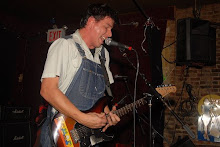
Gustav Mahler
Symphony No. 6
Russian National Orchestra
Sir Mark Elder, conductor
Live broadcast from Tchaikovsky Concert Hall, Moscow
April 17, 2009
After the choices offered on the StateWork blog so far in Mahler symphonies, the specific performance for the Sixth was presenting a greater challenge. There isn't excessive repetition of pieces here, although admittedly there are 'other' recordings of #s 9 and 3 planned for the near future.
Then a few weeks ago this crossed the speakers at State Work, and so here it is. I really love the care with which the orchestra negotiates the myriad turns and expanses of this work. For example, at 6:47 in the Scherzo there is a molar-rattling slowdown and drag though the mud like no other; the strings aren't shy to dig in throughout the performance, when called for. It brings to mind a Barbirolli rehearsal recording where he goads the low strings into really pushing it near the beginning of a Bruckner 7th, repeatedly. I think what Maestro Elder and the Russian National Orchestra achieve here would make Sir John proud- the affinities between the two conductors are more than just a few.
The cover was made from a "...Mark Elder and the Russian National Orchestra rehearsing at the Moscow State Conservatory named after Pyotr Tchaikovsky" photo by Vladimir Vyatkin, STF






.jpg)





















4 comments:
100.92 MB in a .zip file:
http://tinypaste.com/806c3fd
A small point: Mark Elder has received a Knighthood and should be referred to as "Sir Mark Elder", "Sir Mark" or "Elder", as appropriate, not "Mark Elder".
Knighthoods are not handed out for musical ability as such, but for outstanding contributions to musical life in the United Kingdom and certain Commonwealth countries where the Queen is head of state. Elder and Barbirolli earned theirs for their contribution to musical life in Manchester, as indeed did Sir Charles Halle himself. Foreigners also receive the honour, although they cannot use the title "Sir" unless and until they assume citizenship of the UK or one of those Commonwealth countries. Bernard Haitink is an example. He received his knighthood for contributions to music in London, as did Georg Solti, who later became British, so could then (and did) use the "Sir".
We in Manchester are very lucky to have two world-class orchestras: The Halle and the BBC Philharmonic. We also have a first-class chamber orchestra in the Manchester Camerata. We are home to the Royal Northern College of Music - rival to the Royal Academy of Music in London - and are at the heart of that other great British tradition: the Brass Band.
I am an enthusiastic off-air recorder of live and pre-recorded concerts from the BBC. I am happy to share these. How do I get them to you for perusal?
There is a Mahler cycle coming up for broadcast (a co-operative venture between all the above Manchester orchestras) are you interested?
Allen
Absolutely, Allan. Send me an email, if you would: meaned@gmail.com.
My apologies are sincere to the Maestro for my own ignorance of formal nomenclature; I must admit it does nothing to lessen (and quite improbable any further heightening) of his stature in my personal musical firmament. Sir Mark's work doesn't cease to reveal new delights with each new listen.
With that, please do contact me, I'm excited to hear what we can put up for a wider audience here!
No apologies needed: even the BBC has recently adopted a policy of leaving off "Sirs" in their programme lists on the website, and I'm not sure why. Maybe it's an attempt at egalitarianism, or, more probably, a desire not to confuse overseas clients. It is, nevertheless, "bad form".
I have e mailed you separately with a number of links to exemplar files, including an Elder Mahler 1. If you have not received this e mail please contact me on gerald.williams23@googlemail.com asap, as the files will only remain there for a limited period.
Post a Comment